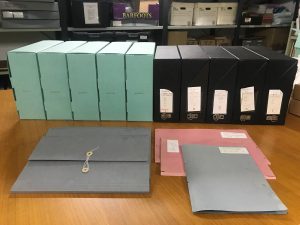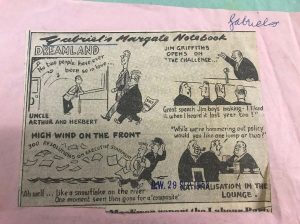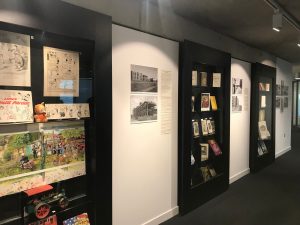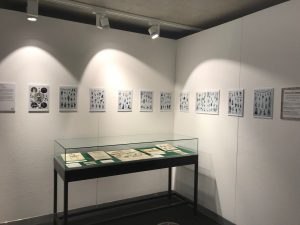Earlier this year Special Collections & Archives hosted two student interns with the generous support of Kent’s Work-Study scheme. Becca and Emily worked on our James Friell collection from the British Cartoon Archive, helping to sort, repackage and list this large collection of cuttings and original artworks. In this second of two posts written by Becca and Emily, they give an overview of their time with us:
Introductions
Hello! We are two interns, working with the Special Collections and Archives, as part of the Work-Study scheme.
I am Becca, a final year Classical and Archaeological Studies undergraduate student. Although my interests are mainly in a far earlier period than is covered by the Friell collection, I’ve found the cartoons both interesting, funny, and in some cases, still relevant – they clearly stand the test of time!
I am Emily, a final year History undergraduate student. The Friell collection has been fascinating to work with, largely my historical interests and expertise surrounds modern political history, as such the collection has helped me with my studies and vice versa.
The Collection
The Friell collection primarily contains newspaper cartoon cuttings and original artwork of the late political cartoonist, James Friell, also known by his Daily Worker pen name, Gabriel. The University of Kent has one of the biggest cartoon archives in the UK and the pieces in their Friell collection easily numbers in the thousands. The collection also features personal items such as small biographies written by Friell himself, personal greetings cards sent to friends, and rough sketches. It’s fantastic to work with a collection as complete as this, where we can read about Friell’s life in and outside of cartoons, and see not only the published work, but the original concepts and artwork, too.
The Task

Before and after: the original folders and boxes for the cuttings are on the right, and the repackaged on the left.
Our first task with the collection was to sort through the thousands of cartoon clippings from both The Daily Worker and The Evening Standard. This involved date ordering the clippings and repackaging the collection to conservation grade standard. Our next task was to then research the original artwork in order to date the pieces, as well as cross referencing with the cartoon clippings we had previously worked with, to organise the artwork and make it accessible for readers.
What were the main challenges with working with this collection?
One of the biggest challenges of working with the Friell collection was also one of the best parts: it is completely uncatalogued and little work had been done on it until we began. Whilst this meant that we had a mammoth task of sorting the collection from scratch, it was also great to know that when we finished the project, we would’ve been responsible for sorting and caring for an entire collection from start to finish.
The biggest challenge came from working with the original artwork within the collection. Whereas with the cuttings, the date was often written on the cartoon or printed on the newspaper, the majority of the original artwork was both undated and in no discernable order – cartoons from The Daily Worker in 1948 mingled freely with those from 1957, where Friell had begun signing his work with his surname, rather than the familiar Gabriel. The only way we had to date these artworks was to search through the cuttings to find the corresponding date that the cartoon had been printed. When faced with thousands of cuttings and thousands of original artworks, you can forgive us if there were tears! Nevertheless, we powered on and in just a few weeks, had the majority of the original artwork listed, dated, and linked to their corresponding newspaper cutting.
What has been the best thing about working in Special Collections & Archives?
We have loved the variety. Whilst caring for and sorting the Friell collection was our primary project, we had the opportunity to help install the Our Templeman exhibition in the Library’s Gallery space, including cases dedicated to the Maddison collection and David Drummond Pantomime collection. This not only taught us the practical handling and displaying skills necessary for exhibition work, but also gave us the opportunity to work with varied collections outside of Friell.
The whole experience has been fantastic, the Special Collections & Archives team are so lovely to work with and the feeling of completing a task the size of the Friell collection was amazing. Most of all, this internship has provided us with invaluable experience, which has meant that we both have either secured a place in further education or a graduate role within the archive sector, something that seemed unattainable without this role.



